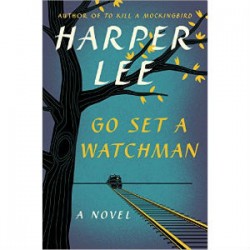
You almost want to wish that the lost manuscript from Harper Lee had never been found.
I say almost, because I think it’s better for the telling of To Kill a Mockingbird that it was found, in several ways.
So Atticus Finch had joined the Ku Klux Klan as a youth. We will learn that in Go Set a Watchman. Yeah, indeed, shudder the thought, definitely, but one can also view that and then his move to defend Tom Robinson against rape charges to the best of his ability in a more nuanced light considering.
The Atticus Finch that millions of Americans have read as a 1930s Southern progressive was anything but. Indeed, he would fit in as your stereotypical modern-day Fox News hyper-junkie: a firm proponent of states’ rights, a critic of Social Security, a critic of the NAACP who Scout, grown up by the time we get to Go Set a Watchman, thinks has more in common with Hitler than FDR.
This Atticus Finch, more fairly likened to a George Wallace than a Hitler, stood up for Tom Robinson. As messed up as his world view may have been, there’s a moral foundation there that’s worth exploring more in depth.
Consider the era that this Atticus Finch would have come of age in. He was a lawyer in the 1930s in To Kill a Mockingbird, and by the 1950s in Go Set a Watchman, he was in his early 70s. Born in the 1880s, barely a generation after the Civil War, the echoes of Reconstruction still faint, his life spanned Jim Crow, beginning to end.
And yet his moral compass told him to do more than pay lip service to being a court-appointed defense attorney for a black man accused of raping a white woman, and in so doing made an impression on his young daughter, who took from the experience not only that one needs to stand on the side of justice when called by history to do so, but to become an active participant in bending the arc of history in the direction of justice.
Leaving the story crafted by Harper Lee and then delving into what motivations the author Harper Lee may have had in telling these two stories, both To Kill a Mockingbird and Go Set a Watchman, we should keep in mind the story behind the story that had Lee submitting the manuscript that has become Go Set a Watchman and being told by an editor to revise it to focus more on the story as told through the eyes of Scout as a youth.
Good move there, obviously, in terms of what that final product was to become, but we will see from Go Set a Watchman that it was a story that was incomplete. The full storyline would have tracked Scout’s view of her father as the hero of her youth to the seemingly bitter old man that she came to know in her mid-20s, and in the process we would have seen that the change that was coming in the South, and remember, this manuscript was written in the 1950s, at the height of the change that was coming in the South, was as much generational as it was anything else.
Injecting myself back into this telling of the Atticus Finch story, I can add some personal experience that makes more sense to me now seeing these two stories as one in the form of my maternal grandmother, a child of the South born in the 1920s.
Like Atticus Finch was to Scout in To Kill a Mockingbird, my grandmother was my childhood hero, working at a state psychiatric hospital with co-workers of all races and nationalities, taking me with her to an employee Christmas party when I was four that sticks with me to this day. I won a cakewalk, and I remember that I was getting picked on for being the “little white boy” leaving with the big cake, and crying to my granny about it.
The lesson she imparted to me that night that I carry with me today: you’re not better than anybody else, and don’t let anybody else treat you like they’re better than you.
And she lived that. Her friends included African-Americans, Asian Americans. She interacted at her job with governors, senators, coming through town on tours for pictures, and she gave them proper hell.
My hero from youth would occasionally, I’d notice, drop an n-word bomb when I was an adult. She related to me when I was in college that she’d gone door-to-door in the ’60s stumping for George Wallace.
I went through a bit of a period of mourning at that point for the hero that I’d thought was not quite what I’d thought, but she wasn’t done with her surprises. The last presidential election of her lifetime was 2008, and by that point in her life she was comfortable enough to tell people that she was supporting Barack Obama, even though she’d hasten to point out that she’d really wanted to see Hillary Clinton get the nomination, because it had been her life’s dream to vote for a woman for president.
With word now that Lee may have written a third novel in the series that has yet to be published, I’ll hold out hope that Scout comes to further understand the nuance in personality of her hero father, and also realize, as I have come to realize, that the heroes of our youth made possible the people that we were inspired to become.
– Column by Chris Graham










